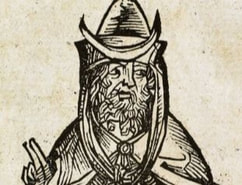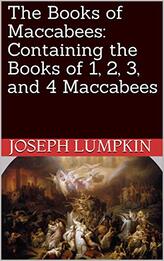
To understand how Jesus leads, we must understand what kind of leaders were rallying people to their cause in first-century Israel. He wasn’t the only one claiming to be the Messiah. Many self-proclaimed kings were carving out what they thought would create God’s kingdom on earth. So he had to boldly demonstrate what leaders in God’s economy really did.
The 2nd Century BCE leaders who sacrificed their lives defined a path for future Messiahs that sharply contrasted the strategy of political revolutionaries. Their undeserved suffering to death became emblematic of faithful leadership long before Jesus spoke his defiant definition of servant leadership: “I did not come to be served, but to serve and to give my life as a ransom for many.” For those of us who want to follow Jesus, we should carefully explore the kind of counter-cultural path he blazed to know what kind of life he has called us to live.
Jesus did not get his model of leadership from the messianic pretenders of his day. Other would-be kings that Josephus describes during the first Century had one clear motivation: power. Judas, the son of Ezekias, is a good example. Josephus notes, “He caused fear in everyone by plundering those he encountered in his craving for greater power and in his zealous pursuit of royal rank” (Josephus, Jewish Antiquities 17.272). He wanted power and a crown. Revolutionary leaders like Judas declared themselves king and were bent on building their kingdom through violence. They defined a path to power that Jesus ultimately rejected.
The violent revolutionaries of Jesus’ generation were inspired by the 200-year old stories of the Maccabean revolt. You can read those stories in 1 & 2 Maccabees. The revolt’s leader Judas Maccabees rebelled against the Greek rulers who tried to extinguish their faith, and effectively employed guerrilla warfare tactics. The scrappy rebels eventually forced the Greek ruler, Antiochus Epiphanes, to cut a deal with them so he could turn his attention to internal affairs. As a result, Maccabean descendants became rulers of Judea. And revolutionaries in Jesus’ day hoped their attacks on Roman troops would have the same outcome.
But Jesus took a different route to his coronation. He was inspired by a different path to purchasing freedom for his people. The example came from the Maccabean era, but not from the Maccabean generals. His inspiration came from old priests who died for what they believed in and the people who followed their example.
Onias, The Suffering Messiah
During the Maccabean revolt, the military leader Judas Maccabees motivated his army with a vision of a heroic high priest who lost both his position as priest and then his life in defense of proper worship. 2 Maccabees 15:12 describes Onias the priest in exemplary terms:
In his vision, Judas saw Onias, who had been high priest and was virtuous, good, modest in all things, gentle of manners, and well-spoken. From childhood he had learned all things that properly belong to a good moral life. This man had his hands extended to pray for the entire nation of the Jews.

The political opponents of Onias in the 2nd Century BCE first had him deposed from his position of high priest and ultimately killed after he publicly accused a subsequent high priest of robbing the Temple to pay for political favor. The tragedy of his undeserved death was mourned by Jews and Gentiles alike.
The significance of Onias’s death was so great that Daniel’s prophecy of the events leading up to the successful Maccabean revolt even mentions his death. Daniel 9 divides up Israel’s history after the Babylonian invasion of Jerusalem around 600 BCE into 3 periods. Daniel pinpoints the death of Onias, the “anointed one” (anointed one = Messiah), as the critical event at the end of the second period. Remember both kings and high priests were anointed with oil and therefore could be given the title Messiah.
There will be seven weeks from the moment the word went out to restore and rebuild Jerusalem until a leader is anointed. And for sixty-two weeks the city will be rebuilt with a courtyard and a moat. But in difficult times, after the sixty-two weeks, an anointed one will be eliminated and disappear. The army of a future leader will destroy the city and the sanctuary. His end will come in a flood, but devastations will be decreed until the end of the war. For one week, he will make a strong covenant with many people. For a half-week, he will stop both sacrifices and offerings. In their place will be the desolating monstrosities until the decreed destruction sweeps over the devastator. — Daniel 9:25-27
- Jerusalem with no anointed leader: 49 years (7 weeks of years) from 586 BCE when the final king of Jerusalem was taken into exile to 537 BCE when a new leader was appointed to return to Jerusalem and rebuild it under Cyrus the Persian’s rule.
- Jerusalem suffering for its sins against God: 434 years (62 weeks of years) from the first Babylonian invasion in 605 BCE to 170 BCE when Onias the “anointed one” was killed, or as Daniel 9:26 says “eliminated and disappeared.”
- The final struggle against the last Greek ruler, Antiochus Epiphanes, who oppressed Jerusalem: 7 years (or 1 week of years in Daniel’s vision) from Onias’s death in 170 BCE to an agreement with Antiochus Epiphanes in 164 BCE that allowed Jerusalem to rule itself independently again.
The death of Onias initiated the final 7 years of what Daniel 9:24 calls Israel’s period “to put an end to their sins, to atone for their guilt.” Does that sound familiar? It is the same purpose that Jesus’ own suffering accomplished.
Jesus’ view of leadership grew out of the legacy of Onias and the saints who followed his faithful path to death. Jesus was no military leader who slaughtered his enemies, but rather he invoked God’s mercy by being slaughtered by them. He knew his unfair fate would cover the sins of many who had been unfaithful. It would demonstrate his righteousness and provoke God to free his people from the consequences of their sin.
In the first century, Jews continued to expound on the idea of this redemptive suffering where a few righteous people could die for the benefit of many. The stories of righteous suffering from 170-164 BCE grew into an entire book about the unjust suffering of righteous people in the final 7 years of Jerusalem’s struggle against foreign powers: 4 Maccabees. 4 Maccabees was likely composed toward the end of the first century when the Gospels were written. And the parallels between the purpose of Jesus’ suffering in the Gospels and the suffering of Jews in 4 Maccabees are striking and instructive.
4 Maccabees essentially provides extended narrative and commentary on ideas introduced in the (mostly) historical account of 2 Maccabees. The two clearest statements in 2 Maccabees about the atoning sacrifice of human lives are found in chapter seven, when righteous members of a family that were killed for their faith proclaim the purpose of their deaths at the hands of their oppressors:
- “You may kill us, but the King of the universe will raise us from the dead and give us eternal life, because we have obeyed his laws.”— 2 Maccabees 7:9
- “I now give up my body and my life for the laws of our ancestors, just as my brothers did. But I also beg God to show mercy to his people quickly and to torture you until you are forced to acknowledge that he alone is God. May my brothers and I be the last to suffer the anger of Almighty God, which he has justly brought upon our entire nation.” (2 Maccabees 7:37-38)
These statements were made by people who faced a deadly decision: either (1) reject God and live or (2) remain faithful and die. They all believed that their undeserved death could wrap up God’s punishment for Israel’s sins and lead to their resurrection. Does that sound familiar?

4 Maccabees recounts the final testimony of the priest Eleazar, a mother, and her seven sons as they are tortured to death (4 Maccabees 1:7-9). 4 Maccabees says their resolve in the face of death was inspired by Shadrach, Meshach, and Abednego (13:9-10), Isaac’s willingness to be sacrificed by Abraham (13:12), and by Daniel in the lion’s den (16:21). They embody Israel’s long history of righteous sufferers ready to do what God wanted, even if it cost them their lives.
The most instructive takeaways from 4 Maccabees are the numerous parallels to the Gospels. Let me summarize the top 10 parallels that show the theological tradition into which the story of Jesus’ suffering fits:
- 4 Maccabees 9:23-24: “Fight the holy and dignified battle for our godly way of life. The just providence that watched over our ancestors might become merciful toward our nation and might punish this cursed tyrant through that battle!”
- Mark 10:45: “For even the Son of Man did not come to be served, but to serve, and to give His life a ransom for many.” (See also Matthew 20:28)
2. Atonement is accomplished by shedding blood
- 4 Maccabees 6:28-29: “Have mercy on your people. Make our punishment sufficient for their sake. Purify them with my blood, and take my life in exchange for theirs.”
- Mark 14:24: “This is My blood of the covenant, which is poured out for many.”
3. People were amazed when they saw how they suffered
- 4 Maccabees 1:11: “All people, including the ones who tortured them, were amazed at their courage and patient endurance.”
- Mark 15:39: “When the centurion, who was standing right in front of Him, saw the way He breathed His last, he said, ‘Truly this man was the Son of God!’” (Matthew 27:54; Luke 23:47); Matthew 27:14: “And He did not answer him with regard to even a single charge, so the governor was quite amazed.”
4. Suffering ensures the unfaithful leaders in the land of Israel will be defeated
- 4 Maccabees 1:11: “they caused the defeat of the tyranny that had oppressed their nation. They conquered the tyrant by their endurance. As a result, their homeland was purged of its filth through their actions.”
- Matthew 23:37–38: “Jerusalem, Jerusalem, who kills the prophets and stones those who are sent to her! ….Behold, your house is being left to you desolate!”
5. False accusations are made to condemn a person under the pretense of saving the nation
- 4 Maccabees 4:1: Onias was an honorable and good man. Simon was unable to injure Onias, even though he falsely accused him of all kinds of crimes, pretending to act on the nation’s behalf.
- Matthew 26:59–60 (NAS): Now the chief priests and the whole Council kept trying to obtain false testimony against Jesus, so that they might put Him to death. They did not find any, even though many false witnesses came forward.
6. The way you live your life validates your message
- 4 Maccabees 7:10: “Your actions made your words about divine philosophy convincing.”
- Mark 2:9–11: “Which is easier, to say to the paralytic, ‘Your sins are forgiven’; or to say, ‘Get up, and pick up your pallet and walk’? But so that you may know that the Son of Man has authority on earth to forgive sins—He *said to the paralytic, ‘I say to you, get up, pick up your pallet and go home.’”
7. Oppressors can kill God’s faithful but not ultimately harm them
- 4 Maccabees 9:7-8: “Even if you are able to kill us because of our godly character, don’t think that you can truly harm us by these tortures. We will gain the awards of moral character through this suffering, and we will be with God, for whose sake we suffer.”
- Matthew 10:28: “Do not fear those who kill the body but cannot kill the soul; rather fear him who can destroy both soul and body in hell.”
8. Unjust death condemns the system that carried it out
- 4 Maccabees “You are the most barbaric tyrant of all. Don’t you think that you are being tortured worse than I am, since you are seeing the proud logic of tyranny defeated by our endurance for the sake of our godly way of life? …You bloodstained tyrant, you won’t escape the revenge of divine wrath!” 9:30-32 (For more on how their unfair death leads to condemnation of the tyrant, see 10:10-11, 15; 11:3-4; 12:18)
- Matthew 27:24–25: “[Pilate] took water and washed his hands in front of the crowd, saying, ‘I am innocent of this Man’s blood; see to that yourselves.’ And all the people said, ‘His blood shall be on us and on our children!’”
9. Martyrs consciously give their life to accomplish a redemptive purpose
- 4 Maccabees 6:27: “You know, O God, that though I might have saved myself, I am dying in burning torments for the sake of the law”; Seventh youngest son willingly gives up his life to exaggerate the tyranny’s evil “After praying against the tyrant, he threw himself into the container of burning coal and so gave back his life.” 4 Maccabees 12:19
- Mark 15:31–32: “In the same way the chief priests also, along with the scribes, were mocking Him among themselves and saying, ‘He saved others; He cannot save Himself. Let this Christ, the King of Israel, now come down from the cross, so that we may see and believe!’”
10. Martyrs expected resurrection as a reward for their faithfulness to death
- 4 Maccabees 7:19: “since they believe that they, like our patriarchs Abraham and Isaac and Jacob, do not die to God, but live to God.” 4 Maccabees 9:8: “For we, through this severe suffering and endurance, shall have the prize of virtue and shall be with God, on whose account we suffer”
- Mark 8:31: “And He began to teach them that the Son of Man must suffer many things and be rejected by the elders and the chief priests and the scribes, and be killed, and after three days rise again.” (See also Mark 9:31)
because of them our enemies did not rule over our nation, the tyrant was punished, and the homeland purified—they having become, as it were, a ransom for the sin of our nation. And through the blood of those devout ones and their death as an atoning sacrifice, divine Providence preserved Israel that previously had been mistreated.
The same type of destruction came to Jewish leaders in Jerusalem who killed Jesus. Within a generation after Jesus died, Rome invaded Jerusalem and destroyed the regime that orchestrated his death. And his blood freed every follower from their sins. Jesus didn’t build an army and establish an independent Jewish state. He gave up his life to establish an eternal and global kingdom of the redeemed.
Lead Servants Change the World
When Jesus discarded the military model that political revolutionaries in his day embodied and instead embraced the redemptive path of Maccabean era martyrs, he established his pattern for leadership. He came to serve and not to be served. His disciples must therefore be “lead sacrificers” rather than leaders who rally other people to serve them in ways they themselves would not.
Jesus ultimately redefined what people expected the “Son of Man” to do. Daniel 7:14 envisioned a time when all nations would serve the Son of Man, but Jesus says the “Son of Man did not come to be served, but to serve.” Jesus combined the role of Isaiah’s “suffering servant” with Daniel’s “son of man.” Isaiah 53:11 defines the greater purpose of the servant’s suffering: “My Servant will justify the many, since He will bear their iniquities.”
Jesus rescued the many by deciding not to rescue himself. He suffered undeservingly to invoke God’s mercy for all. In doing so, he carved a path for all his followers to bring redemption to the world by sacrificing themselves for the cause. It is not an easy path to follow, but it is his plan to change the world. It’s why he told his disciples, “If anyone wishes to come after Me, he must deny himself, and take up his cross and follow Me” (Matthew 16:24).
Any Christian leader who chases political positions to force the world to change through policy or power has missed Jesus’ path. Jesus’ kingdom doesn’t use political power to change the world. We can’t vote Jesus’ kingdom to come. Our position may be a king or a member of congress, but change must be earned through selfless service and not power plays. The kingdom comes as we embrace Jesus’ way of demonstrating love, undermining injustice, and staying faithful, even if it kills us. Admittedly, in our world, the more common consequences are losing your job, getting kicked out of the club, and condemned on social media. Those consequences have real economic and social pain.
I rarely have the courage to walk that road, but Jesus has showed us how. It is a sobering path to follow, but we must each answer the invitation from Jesus every day. Are you ready and willing to serve others, even if it means losing the life our world tells us we should be selfishly fighting for?







 RSS Feed
RSS Feed
